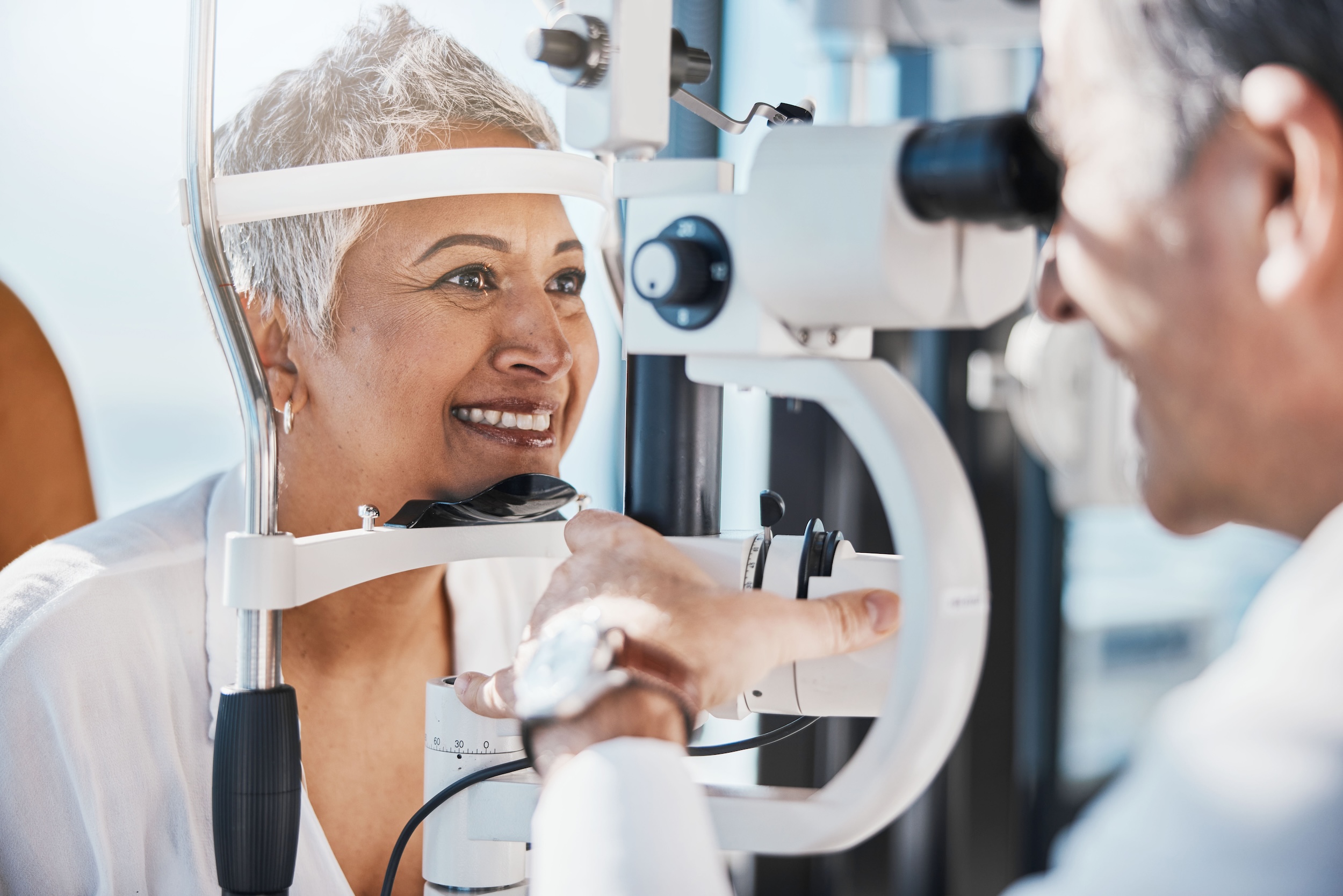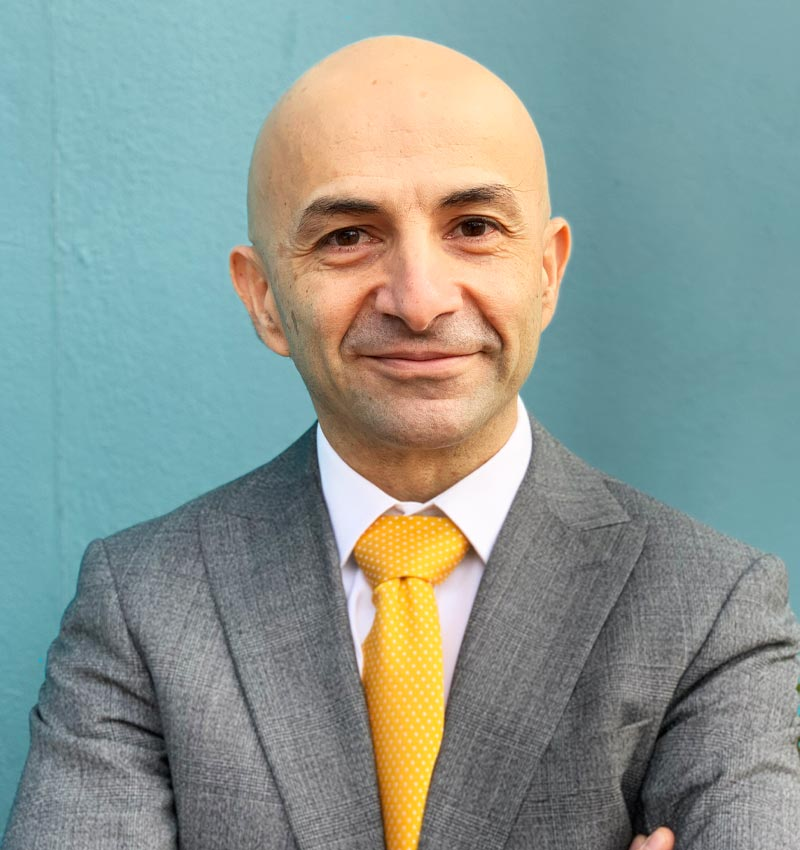Cataract surgery – or lens replacement surgery – is one of the most common and successful procedures in the world. Most patients recover quickly and enjoy clear, sharp vision. Here, we answer common questions about the post-cataract surgery experience, explain what’s normal, and highlight when to seek help. We also explain how you can get a second opinion with Professor Muhtaseb if you have any concerns about surgery performed elsewhere.
What Symptoms are Normal After Cataract Surgery?
A little discomfort or blurred vision is very common in the first few days after cataract surgery. Your eyes need time to heal and adjust to the new lens. Here’s what most patients experience:
- Mild blurry or foggy vision for a 2-3 days
- Light sensitivity in bright conditions
- Dry or gritty feeling in the eye
- Glare or halos around lights in the early weeks
These usually settle as your eye heals and your brain adapts to your improved vision. Using your prescribed eye drops and following aftercare instructions helps speed up recovery.
When to Get It Checked
Some post eye surgery symptoms need urgent attention. If you notice any of the following, contact your surgeon or optometrist straight away:
- Severe or increasing pain, redness, discharge or severe loss of vision in the first few days after surgery
- Flashes, floaters, or a curtain effect in your vision
- Persistent or worsening blurriness after several weeks
These can indicate serious issues such as infection or retinal detachment, or less urgent conditions such as posterior capsule opacification (PCO) – often called a “secondary cataract.”
What If You Can’t Reach Your Original Surgeon?
Not all clinics provide the same level of aftercare. Some patients tell us they struggled to get answers after surgery or weren’t happy with their outcome. If that’s you, don’t worry, you still have options.
Professor Muhtaseb offers second opinion consultations in South Wales for patients who:
- Are worried about their recovery
- Have symptoms their surgeon hasn’t explained
- Aren’t satisfied with their vision after surgery
- Want to explore alternatives, such as premium or multifocal lenses
In some cases, a small adjustment can restore clarity. In others, a more advanced solution, such as piggyback lenses may be recommended.
Find out more about finding the best cataract surgeon nearby.
Frequently Asked Questions After Cataract Surgery
Why is my vision still blurred after cataract surgery?
The most common reason is that a significant glasses prescription remains, especially astigmatism. This need for glasses can be addressed and Prof Muhtaseb will explain all your options.
Mild blurred vision after cataract surgery is common in the first few days as your eye heals and adjusts to the new lens. Dry eye can also cause this. If blurring lasts for several weeks or suddenly returns, speak to your surgeon – it could be a sign of a treatable issue such as posterior capsular opacification (PCO) or swelling at the back of the eye.
Why do I have double vision after cataract surgery?
Double vision after cataract surgery is less common, but it can happen if your eye muscles need time to adjust or if there’s a difference in prescription between your eyes. Sometimes it’s linked to lens positioning or astigmatism. If it doesn’t settle within a few days, let your surgeon know as there are ways to correct it.
Can you have cataract surgery twice?
You only need cataract surgery once per eye because the natural lens is replaced permanently with an artificial lens. However, some people develop a condition called posterior capsule opacification (sometimes called a “secondary cataract”) months or years later. This isn’t a new cataract, but a clouding of the lens capsule behind your artificial lens. It’s treated with a quick YAG laser procedure, not another full cataract surgery.
Is it normal to have vision imbalance after cataract surgery in one eye?
Yes, if only one eye has been treated, you might notice imbalance or strain. This usually improves once the second eye is treated. For many patients, it’s completely safe to have both eyes treated at the same time, or only 1-2 weeks apart, and temporary glasses or contact lenses can help in the meantime if needed.
Why is my astigmatism worse after cataract surgery?
Astigmatism is a term that describes the shape of the cornea at the front of the eye. Surgery will change the corneal shape and the astigmatism. If this is not accounted for before the surgery, and in planning the lens implant, then there will be a significant glasses prescription after surgery and blurred vision needing glasses for clear vision at all times. Toric lenses (a lens with two different curves) will correct this, but this needs to be planned ahead of surgery by taking specialised measurements and using specific calculations to ensure the best possible result.
Below you can see an example of vision outcome without the toric lens (on the left) and astigmatism corrected with a toric lens (on the right).


Is it normal to have foggy vision after cataract surgery?
Mild foggy vision is common in the first few days as the eye heals. If it appears later, it may swelling in the retina which is treated with eye drops, or a secondary cataract which is easily treated with a quick and painless laser procedure. If you’re ever concerned about your vision, don’t hesitate to contact Professor Muhtaseb at iLase – he is happy to provide advice.
What is the treatment for cloudy vision after cataract surgery?
Cloudy vision months or years later is usually caused by a secondary cataract. This happens when a thin layer of tissue behind the artificial lens becomes cloudy, even though the original cataract has been removed. A quick YAG laser procedure can clear this tissue in minutes, often restoring sharp, clear vision immediately.
How to improve near vision after cataract surgery?
After standard cataract surgery, your distance vision is usually improved, but you may still need reading glasses for close-up tasks. Options to reduce dependence on glasses include multifocal lenses or piggyback lenses. Professor Muhtaseb can advise on the best solution for your eyes and lifestyle. Find out more in our ‘Is it better to be nearsighted or farsighted after cataract surgery? ‘ guide.
Why Patients Choose Professor Muhtaseb at iLase
Choosing the right cataract surgeon is about more than skill, it’s about reassurance. Professor Muhtaseb is known for his personal approach: giving his patients his mobile number so they can reach him directly if they’re worried. That peace of mind makes all the difference when you’re recovering from eye surgery.
If you’re experiencing worrying symptoms after cataract surgery, or you’d like a second opinion on your results, book a consultation with Professor Muhtaseb. Whether you need reassurance, further treatment, or an advanced lens solution, expert advice is just a call away.





